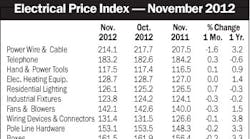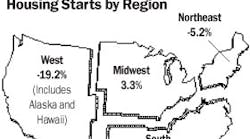Latest from Mag
People - Dec 21, 2012
Obituaries - Dec 21, 2012
November EPI Index Shows No Change
Housing Starts Dip 4% in November
Electrical Marketing - December 21, 2012
Around the Industry - Dec 21, 2012
Electrical manufacturers are more bullish about the economic conditions in the electrical industry, according to the Electrical Business Confidence Index (EBCI), a monthly survey of senior executives at member firms of the National Electrical Manufacturers Association (NEMA), Rosslyn, Va.
For the first time since April 2004, confidence in current conditions affecting the electrical industry in North America expanded from the previous month, improving five points to 61.5 in November. A reading above 50 indicates conditions are favorable for growth.
The Latin America index also expanded, moving from 57.9 in October to 59.4 in November. The other two regional indexes did not fare so well. Asia/Pacific contracted from 58.3 to the threshold value of 50, suggesting a tenuous level of confidence. Meanwhile, Europe slipped nearly 10 points to 46.2 this month, falling completely below the presumed growth threshold.
Three of the four regional future conditions indexes improved or remained essentially unchanged, while one index narrowed considerably. The North America future conditions index has resumed its typically expansive view of business conditions six months out, reaching 76.9 in November. The Latin America future conditions index expanded sharply from 63.2 to 75.0 in November, and confidence in Asia/Pacific changed only incrementally from 61.1 to 60.0. As with the current conditions indexes, Europe witnessed the only significant erosion in confidence in future conditions, contracting from 60.0 to 42.9.
Raw material costs again received most of the attention from NEMA manufacturers. Most respondents said increasing costs are putting pressure on margins, although there were mixed indications regarding whether manufacturers have had to continue absorbing the increases or, instead, have been able to pass some portion of them along. Interestingly, one panel member noted that moderation — not outright decline — in energy and steel cost increases has helped improve business conditions. According to the panel, some soft spots still exist in the economy, primarily in the industrial and utility business segments. Otherwise, comments seemed to point to steady, not spectacular, economic growth following a slow patch earlier in the year.
Concerns over future materials prices remain the biggest concern for EBCI panel members. Most respondents did not expect the upward trend to ease over the next six months. More than one respondent noted persistent weakness in the U.S. dollar as a concern. Additionally, some panelists expected interest rates to continue rising. On the positive side, nonresidential fixed investment, generally, and telecom, in particular, were expected to improve.
Several panel members said the political situation in the United States and events on the global stage will have an impact on future business conditions for the industry.
“With the election now decided, and uncontested, and majorities in both houses of Congress, favorable conditions exist for movement on an energy bill,” said one manufacturer. “This could boost utility infrastructure spending in the second half of 2005 and beyond. On the downside, the U.S. dollar-to-Euro exchange rate is troubling.” Added another panel member, “In six months I expect lower oil prices and a calmer Iraq. With those two improvements, the world wide economy should stabilize.”

